unit8 How was your school trip period3
Unit 8How was your school trip

Unit 8 How was your school trip? 教学设计一、教材分析本节课是《新目标英语》八年级上册第八单元第一课时。
本节课的话题是谈论过去发生的事情。
它涉及到了动词一个非常重要的时态——一般过去时。
一般过去时是我们生活中使用频率最高,最广泛的英语时态之一。
所以它的学习和运用对于学生来说是至关重要的。
关于一般过去时,在七年级下册已经学习过,所以本节课可以说是对一般过去时的复习,但在复习的基础上又引入了There be句型的一般过去时。
并且以school trip为话题引出来,因此,本节课是对一般过去时的全面复习和训练。
二、教学目标1. 知识目标1)词汇gift, shark, aquarium, seal, hang, hang out, souvenir2)句型结构Were there any sharks in the aquarium? Yes, there were./ No, there were n’t.What did you do on vacation? I went to the park.Did you go to th e zoo? Yes, I did. /No, I didn’t.Did he/she go fishing? Yes, he/she did. /No, he/she didn’t.2. 能力目标1) 谈论发生在过去的事情。
2) 学会学会使用一般过去时。
3) 认识一些海洋动物。
4) There be 句型的一般过去时。
5)培养和训练学生听说读写能力。
3. 策略目标利用不同媒体获取相关的学习资源;用自己的生活经历来引导学生表达自己的经历;通过合作、探究的方式学习,谈论自己的生活经历和体验。
4. 情感目标能够正确表达自己的生活经历和体验,学会与他人交流。
三、教学重、难点1. 重点:学习及掌握本节课所涉及的词汇和一般过去时的陈述、一般疑问和特殊疑问句形式。
Unit 8 How was your school trip 第三课时课件图文
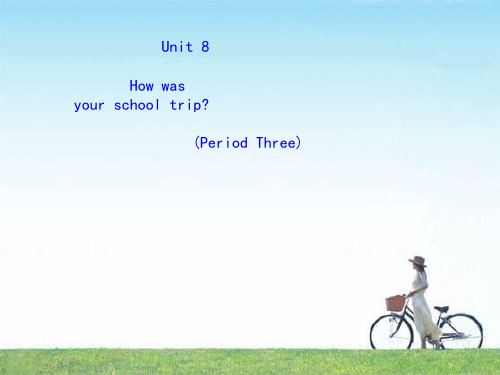
Practice: Talk about Tina's and Tony’s last day off in pairs.
Tina
went camping went for a drive
rained boring
Tony
went to his friend Dave’s house
helped mom and dad slept late
____ Tina
____ _T_on_y _
Listen again and fill in the blanks.
Tina ______wceanmtping and the weather___ terrible. Itwas
______all day.raSihnee_d________
didn’t have
1b Pair work:
What do you want to do on your next day off? What do you not want to to do ?
Sample:
A: On my next day off, I don’t want to go for a drive. That sounds really boring. B: Oh, really? I think that sounds fun.
Unit 8
How was your school trip?
(Period Three)
Lead in
• Did you have a good day off or a bad day off? • What was it like? • What did you do?
1a Talk about these activities:
Unit 8 How was your school trip

seahorse
dolphin shark
Were there any seals in the aquarium?
,there were .There were some seals in/at the aquarium.
Were there any sharks in the aquarium?
He __h_a_d__ a fantastic day!
What did Liu Xiang’s friend Tina do on her school trip?
Turn to Page 47 1b
What did Tina do on her school trip?
1b Listen and circle the expressions in the box.
We should report like this:
Liu Xiang went to the aquarium last weekend. He saw… . He bought….. He had a good trip.
What did you learn in this class?
go to the aquarium take photos hang out with friends see some seals buy a souvenir get one’s autograph
tigers
seals
Were there any … in the aquarium?
Yes, there were / No, there weren’t.
sharks
pandas
elephants
In the aquarium,What did Liu Xiang do?
Unit 8 How was your school trip

Unit 8 How was your school trip? 重要词组1. go to the aquariums去水族馆2. take photos照相,拍照3. hang out with sb.和某人闲逛4. buy a souvenir 买一件纪念品5. get his autograph 得到他的签名6. win a prize得奖7. win the first prize 获得一等奖8. a famous actor 一个出名的演员9. have a great time = have a good time= have fun玩得高兴10. on a school trip 在学校郊游11. go to Blue Water Aquarium蓝色水族馆12. visit the Visitors’Center参观游客中心13. watch a dolphin show 观看海豚表演14. after that 在那之后15. go to the Outdoor Pool 去户外泳池16. go to the Gift Shop 去礼品店17. take the bus back to school乘公共汽车回学校18. lots of=a lot of许多,大量19. at the end of 在……的尽头20. the class monitor 班长21. after the trip 郊游结束后22. day off休假日on my last day off 在我上一次休假日on my next day off 在我下个休假日23. go for a drive开车兜风24. help sb. do sth.帮助某人做某事help sb. with sth.25. take a class 上课26. sleep late 睡过头/懒床27. go camping in the rain 在雨中野营28. a busy day off 一个忙碌的休假日29. have fun (in) do ing sth. 做某事很开心30. rain all day 下了一整天的雨31. watch DVDs 观看DVDs32. have a yard sale 进行庭院旧货出售33. get wet 淋湿34. thanks for doing sth.谢某人做了某事35. win the first prize 获得一等奖36. in yesterday’s singing competition 在昨天的歌唱比赛中37. in the future 在未来重点句子1.How was your school trip?你的学校郊游怎么样?how 用于提问情况/状态2.Class 9 had a great time on the school trip.九班在学校郊游中玩得很开心。
八年级英语Unit 8 How was your school trip知识精讲
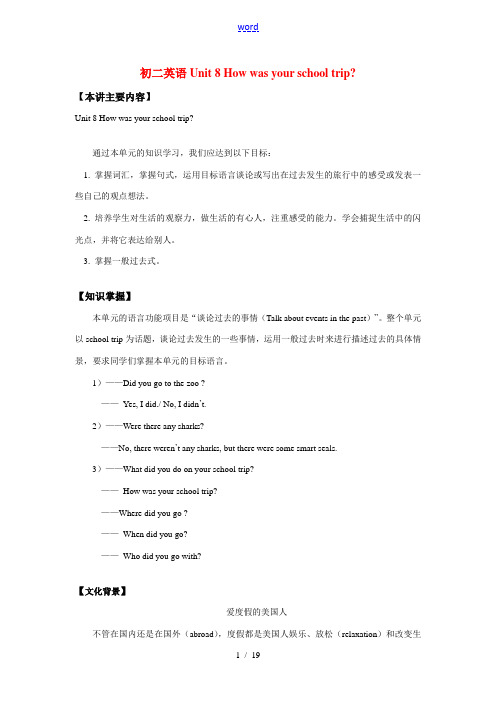
初二英语Unit 8 How was your school trip?【本讲主要内容】Unit 8 How was your school trip?通过本单元的知识学习,我们应达到以下目标:1. 掌握词汇,掌握句式,运用目标语言谈论或写出在过去发生的旅行中的感受或发表一些自己的观点想法。
2. 培养学生对生活的观察力,做生活的有心人,注重感受的能力。
学会捕捉生活中的闪光点,并将它表达给别人。
3. 掌握一般过去式。
【知识掌握】本单元的语言功能项目是“谈论过去的事情(Talk about events in the past)”。
整个单元以school trip为话题,谈论过去发生的一些事情,运用一般过去时来进行描述过去的具体情景,要求同学们掌握本单元的目标语言。
1)——Did you go to the zoo ?——Yes, I did./ No, I didn’t.2)——Were there any sharks?——No, there weren’t any sharks, but there were some smart seals.3)——What did you do on your school trip?——How was your school trip?——Where did you go ?——When did you go?——Who did you go with?【文化背景】爱度假的美国人不管在国内还是在国外(abroad),度假都是美国人娱乐、放松(relaxation)和改变生活环境的极好机会,是一家人一起过闲暇时光、相互加深了解的机会。
美国的大城市是人们旅游的热点之一。
一年到头,曼哈顿(Manhattan)的街上和酒店里都挤满了游人,他们来这里观看摩天大楼(skyscrapers)、参观博物馆和艺术画廊(art galleries)、上歌剧院(operahouses)、戏院和著名的特色商店(specialty shops)或在优雅的餐馆里就餐。
八年级英语Unit8 How was your school trip...

Class 9
First
Visitors’ Center
and
At the end of the day
school
Then After that
Finally
After lunch
had Class 9 ____ (have) a great time on the school trip. went They ______(go) to Blue Water Aquarium for the day. First they _______ (visit) the Visitors’ Center and visited watched _______ (watch) a movie about sharks. Then they watched _______ (watch) a dolphin show. After that, they _______ (go) to the Outdoor Pool and ______ (see) a went saw went big octopus. After lunch , they ______ (go) to the bought Gift Shop and ________ (buy) lots of gifts. Finally,
Step 8
Sum up
1. Simple past of regular and irregular verbs. 2. Be able to talk about events in the past
Step 9 Homework
1. Review Simple past of regular and irregular verbs. 2. Write a short article about your last trip.
Unit8Howwasyourschooltrip?教案
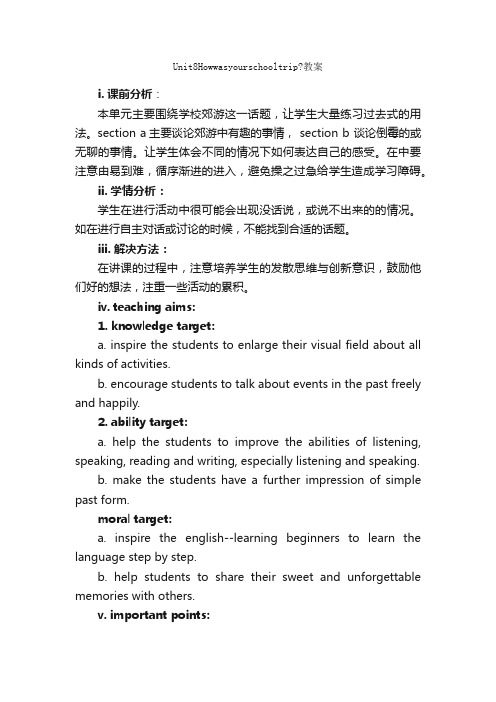
Unit8Howwasyourschooltrip?教案i. 课前分析:本单元主要围绕学校郊游这一话题,让学生大量练习过去式的用法。
section a主要谈论郊游中有趣的事情, section b 谈论倒霉的或无聊的事情。
让学生体会不同的情况下如何表达自己的感受。
在中要注意由易到难,循序渐进的进入,避免操之过急给学生造成学习障碍。
ii. 学情分析:学生在进行活动中很可能会出现没话说,或说不出来的的情况。
如在进行自主对话或讨论的时候,不能找到合适的话题。
iii. 解决方法:在讲课的过程中,注意培养学生的发散思维与创新意识,鼓励他们好的想法,注重一些活动的累积。
iv. teaching aims:1. knowledge target:a. inspire the students to enlarge their visual field about all kinds of activities.b. encourage students to talk about events in the past freely and happily.2. ability target:a. help the students to improve the abilities of listening, speaking, reading and writing, especially listening and speaking.b. make the students have a further impression of simple past form.moral target:a. inspire the english--learning beginners to learn the language step by step.b. help students to share their sweet and unforgettable memories with others.v. important points:sentence pattern: what/ where/ when did you do...?i did...vi. difficult points:a. the past form of the verbs.b. let students ask and answer the events in the past.vii. teaching strategies:a. task-based approachb. situational methodc. audio-lingual methodviii. teaching instrument:recordermulti-media computerix. 课时分配第一课时:section a第二课时:section a第三课时:section b第四课时:section b第五课时:self check , 总结x. teaching processperiod onestep 1: greetingstep 2: grammargive students some verbs. ask them to change these verbs into past form. at last ask them to sum up the rules.play—played, visit—visitedstudy—studied, use—usedgo—went, have—hadis—was, are—weredo—did, take—tooksee—saw, eat—atebuy—bought, fly—flewstep 3: 1a1. free talk: if we will have a school trip this weekend, what do you want to do? (ask students to think out as many activities as they can. write them on the blackboard. )2. change these activities into the past form.3. pair workask your partner what he did last school trip using the sentence pattern “did you do...?”step 4: listening 1blisten and circle the activities in the box. ask students to repeat after the tape.。
八年级英语Unit8 How was your school trip Period 2,3新课标

Unit 8 How was your school trip ?- Period 2Teaching procedures :Step 1 Leading inGreeting : talk about what last day off was like .Was it a good day off or a terrible day off ?Step 2 Pre-taskSB Page 50 , 1a , 1b .Look at the pictures .say something about the pictures .Point out the five phrases .Ss read after teacher .Make sure Ss understand what they should do .Rank them from 1-5 .Pay attention to the conversation in the box on the right .Read .Pairwork : make conversations .Share the students’ conversations .Step 3 While-taskSB Page 50 , 2a , 2b .Say , Now you will hear a conversation about what Tina and Tony did on their last day off .Point out the sample answer in 2a .Listen carefully twice .Fill in the chart.Read the sentences in 2b .Pay attention to who said these things .Play the tape again .Listen carefully .Check the answers .SB Page 49 , 3a .Ask one student to read the article .Ss read and work : correct the statements below .Listen to the recording .Read after it .Ask Ss to read together .Step 4 Post-taskPairwork: Make conversations with your partner using these phrases : Were there … ? Did you see … ? Did you go … ?Step 5 HomeworkMake up a story .教学后记Unit 8 How was your school trip ?- Period 3Teaching procedures:Step 1 Leading inFree talk .Check the homework .Step 2 Pre-taskSB Page 51, Part 4 .Say ,Here are some photos of your last vacation .What did you do ?Ask and answer with your partner .Question like this : Did … ? What … ? Were there … ?Where … ? How was … ?Pairwork .Step 3 While-taskSB Page51 ,3a .Read the letter about the things Nick did by Ss .Explain the new words .Play the tape .Ss listen and repeat .Point to the number 1-5 .Point out the sample answer.Ss work .Then check the answers .Play the tape again .Practice reading .SB Page 51 , 3b .Say , Imagine you are Tony and you’ll give Nick a letter .Point out the letter .Read the letter to the class .saying blank each time when e to a blank line .Read the letter and fill in the blank .Ask one student to present the answers .Step 4 Post-taskSB Page 51, 3c .Say :We read about the things Tony and Nick did .What did you do on your last day off .Let’s write a letter about them .Give them help if they need .Ss work .Step 5 Homeworkplete the selfcheck .教学后记。
八年级英语Unit 8 How was your school trip?新人教版

Unit 8 How was your school trip?一、知识目标1)教学生掌握动词的过去式中规则动词和不规则动词的变化形式2) 教学生掌握一般过去时的肯定句,否定句及一般疑问句3)教学生掌握运用一般过去时描述过去发生的事情二、能力目标1)听:能听懂描述假期活动的对话材料。
2)说:能够谈论过去发生的事情。
3)读:能读懂描述假期活动的文章。
4)写:能写出SectionA和Section B中的重点单词和重点句型,并能够描述自己的假期活动。
三、策略目标1) 教学生学会通过看、听、说和讨论来获取已有的信息。
(看图作问答)2)通过小组活动学习,学生能自由谈论自己做过的事。
(个体与群体思维)3)通过本单元谈论过去发生的事情,可从谈论学校郊游引出话题,从而导入一般过去时的使用,学会描述过去做过的事情。
(个性化学习)四、德育目标1)通过本单元的学习,对比过去与现在,培养良好的行为习惯。
2)通过生态旅游学习,学会保护大自然,陶冶情操。
五、重点与难点1)重点:掌握一般过去时的一般疑问句形式:a. Did you +动词原形…?b.Were you +表语…?2)难点:规则动词的过去式与不规则动词把握及运用。
a.规则动词:1)一般情况动词后加-ed: ask—asked2)有e结尾加-d:dance—danced3)双写情况再加-ed:stop—stoppedb.不规则动词:have—had, go—went, do—did, are—were六、教学准备1)some pictures about places of great interest2) A tape-recorder, multi-medium,3)教学课时为五课时第一课时(The First Period) Look, speak and Listen for Section A一、Teaching process designStep 1: Warming up and lead inGreeting and show students some pictures about places of interest such as the Great Wall, Tian’anmen Square, Jiouzaigou.Lead in with such questions: 1. Do you enjoy your holiday? –Yes, very much. 2. Did you go to the places which are shown in the pictures? Yes, I did. 3.When did you go there? Last holiday. 4.What did you do there? I took photos and bought a souvenir. Who did you go with? With my parents.They may elicit various answers. Ask students to work in groups to make a list about where to go for their last school trip and what to do there.Then the teacher focuses on the picture and asks students:T: Who is the girl with a shark on her head?S: She is Tina.T: Where did she go for her last school trip?S: She went to the aquarium.T: What did she do there?S: She took photos, saw some seals, bought a souvenir, ate some ice cream, … and so on.Next, the teacher leads students to practice listening. Everybody has his own way to enjoy his school trip like Tina’s. The experience of each person is quite different from the others’. They may go to the zoo or go to the aquarium. Let’s listen to the tape in 1b and see where Tina went and what she did there. The tape is about Tina’s partner is asking Tina about her last school trip. Ask students to listen to the recorder carefully and circle the expressions in the box.After listening,the teacher lists what students heard with a form on the blackboard to check the answers like this:Then get students to learn the irregular form of the past verbs:Go—went, take—took, have—had, eat—ate, hang—hung, see—saw, buy—bought, are—were,do—didStep 2: PairworkBefore working in pairs, students should remember the expressions in 1b. Give students a few minutes to review the expressions. After that ask students to discuss what the children in the picture do on their last school trip to follow the sample dialogue:A: Look at Tina. What did she do on her last school trip?B: She went to the aquarium.A:What did she see there?B:She saw some smart seals.A: I like smart seals, but I never go there. Did she see any sharks?B: No, there weren’t any sharks.A: Did she buy a souvenir?B: No, she didn’t. Her friend Grace bought a souvenir.A: Did she hang out with her friends there?B: No, she didn’t. She took photos.A: Did she have pizza?B: No, she ate some ice cream.The teacher moves around the classroom and give some help as needed. Ask pairs of students to show their work. Praise them for their excellent work.Step 3: Look, Listen and Write2a & 2b provide guided listening and writing practice using the target language. The teacher asks students to listen to the tape and check the questions they hear with “∨”.1.____ Did you buy that hat?2._____ Did you win that hat?3.____ Did you take any photos?4.____ Did you get his autograph?5. ____ Did you see any sharks?6.____ Were there any seals?7. ____ What else did you do?Ask students to pay attention to the structures of the sentences. Explain the underlined parts to students.And tell the difference between them.Did + subject +original verb…?Affirmative answer:Yes, I/we/they/she/he did.Negative answer:No, I/we/they/she/he didn’t.Wh-word +did + subject +original verb…?Answer Wh-question with a statement sentenceWere +there + noun pl…?Affirmative answer:Yes, there were. Negative answer:No, there weren’t.Now ask students to listen to the tape and circle “T” or “F” while they are listening.Then check the answers with students by asking students some questions like this:T: Did Tina meet a famous actor?S: Yes, she did.T: Did Tina get Jake Dean’s autograph?S: Yes, She did.T: Did Toby win a prize?S: No, he didn’t.T: Did Tina win a hat?S: Yes, she did.T: Were there many actors at the aquarium?S: No, not too many.T: Thank you all.Then ask students to make sentence transformation from a state ment sentence to a “Yes or No”question with the sentences given in 2b:Answers: 1. Did Tina meet a famous actor?2. Did Tina get Jake Dean’s autograph?3. Did Toby win a prize?4. Did Tina win a hat?5. Were there many actors at the aquarium?And list the past forms of the irregular verbs: meet—met, get—got, win—won, are--were. Then read them. (Finish 2b)Step 4: Practice with pair workAsk students to make a dialogue by asking and answering questions according to the information in activity 2b in order tostart oral practice using the target language with the following sample like this:A: Did Tina meet a famous actor?B: Yes, she did. She met Jake Dean.A: What did Tina get from Jake Dean?B: She got an autograph.A: Did Tina win a prize?B: No, she didn’t. She won a hat.A: Were there many actors at the aquarium?B: No, not too many.Then ask students to work in pairs and practice the conversation above. While students are working, the teacher is moving around the room giving some help as needed. Ask pairs of students to show their works. Praise them for their good works.(finish 2c)Step 5: Homework1) Sum up the Past Tense sentence & the past forms of the irregular verbs.2) Preview 3a ,3b & 4 on Page 49.二、Word Explanation1. else adv.其他,另外,别的。
unit8 How was your school trip period3课件

Make up a story. Each student adds a sentence.
Modle: Last week I visited my aunt’s house. She lives in California. The weather was beautiful. I went swimming.
Make the sentences
beach, I , last night, my parents I went to the beach with my parents last night.
summer camp, last summer we, take part in
We took part in the summer camp last summer.
1.Where/When/Why/Who/What/How/…
2.Safety tips.
3.equipment.
Yandang Nanji Island Jiangxin Island Nanxi Jiang
Report:We are from Group 1, we went to Yandang on National Day this year,…
Sounds like a busy day off! ____
Can you believe it?
____
Talk about Tina and Tony’s last day off in pairs.
Each group chooses one of the places in China and talk about the trip,Including:
【良心出品】Unit 8 How was your school trip 教案 八年级英语

Unit 8 How was your school trip? 教案Part 1 Understanding of the teaching materialI. Status and Function“Go for it!”is based on “Task-Based Language Teaching”. It adheres to “The authenticity principle”, “The form-function principle”, “The task dependency principle” and “The principle of learning by doing”. These principles all accord with the demands of curriculum focus.In Unit 5 and Unit 10 of Grade Seven (II), “Go for it!”, students have learned “The Simple Past Tense”. And it appear s again in Unit 8 of Grade Eight (I). Unit 8 teaches students more about how to talk about events in the past. In addition, it gives affirmative and negative statements in the past tense, such as the sentence patterns “Did you see …?” “Were there …?” “Did you go …?”As the first part of Unit 8, Section A opens with a picture presenting the last school trip in the aquarium and continues with several step-by-step practice activities, which are all good for students to master “The Simple Past Tense”. Doing well in Section A will help students integrate the new target language with that in Section B. Thus, they can describe the events in the past freely and foster their own ability of reflecting and practicing.II. Teaching ObjectivesTeaching objective is the beginning and aim of teaching activities. According to the overall goal of the English elementary course---improve students' synthetic abilityof language application, which should be based on the development of students’“L anguage knowledge”,“L anguage skills”, “C haracter building”, “Learning strategies” and “Cross-cultural awareness”. The teaching objectives are described as follows(I). Knowledge objectivesi. Master the simple past tense of regular and irregular verbsii. Recite the new words and expressions about the last school trip in the aquarium, including theirpronunciation and intonationiii. Master the key sentences and learn how to talk about the past events(II). Ability objectivesi. Understand the two dialogues and gain the information to foster the listening skills ii. Use the discourse markers to organize sentences together to form a short story and interview others to foster the speaking skillsiii. Understand the reading material and find the answers on the wall to foster the reading skillsiv. Write down the correct sentences to foster the writing skills(III). Moral objectivesi. Encourage students to think and talk in English through communicative tasks and provide thestudents with the chances of cooperationii. Get students to realize the importance of protecting animals and help them build upthe sense ofenvironmental protectioniii. By visiting the aquarium, encourage students to know more about our culture and love our countryIII. Teaching important points and difficult pointsAccording to the demands of the curriculum focus---“The Simple Past Tense” is one of the most important tense that students should master, the status and function of this unit, the teaching important points and difficult points are described as followsTeaching important points:(i)The key vocabulary about the animals in the aquarium(ii)Affirmative and negative statements in the past tense, “Did you, Were there” questions.(iii) The ways of talking about the events in the past.T eaching difficult points:(i)Create the situation for students to use “The Simple Past Tense” and the sentence patterns “Did you see …?” “Were there …?” “Did you go …?” freely.(ii)Find out the answers on the flashcards outside the classroom by understanding the questionson the screen.(iii)Guide students to make up their own dialogues by interviewing the famous persons.IV. Arrangement for the teaching materialDavid Nunan pointed out that “Don’t use just the textbook. Anything in real life that connect and appropriate to the lesson can be used as teaching resources.”Teachers should use the textbook to teach rather than teach the textbook. McGrath (2002) also pointed out that the adjustment of the teaching material should be based not only on the structure of the material itself, but also on students’ learning process. So the arrangement should be student-centered. In addition, “Go for it!” emphasizes on “language application”and “cultivating students’ability of innovation and practice”. Curriculum focus lays stress on “C haracter building”, “L earning strategies” and “Cross-cultural awareness”. And innovation can help cultivate students’autonomous learning and cooperative learning. So, the arrangement for the teaching material is described as follows:On recycling “The Simple Past Tense”, present some pictures about the recent past events in the world and have students describe them instead of asking the question in 1a. On teaching the key vocabulary, the videotapes and flash are used to attract students’ attention. The tasks of “Test your memory” and “Guessing games” are selected on teaching the key sentence patterns “Did you see …?” “Were there …?”and “Did you go …?” in 3b. The task of inter view is to talk something about the last trip between “reporters” and “famous persons”. The task of “Can you find them out on the wall?” focuses on students’ skills of listening, speaking, reading and writing. Students won’t find the answers outside on the wall until they understand the reading material in 3a. And the last task “ Use your imagination” asks students to summarize what they have learned, then use “The Simple Past Tense” to make up astory by adding sentences themselves.Part 2 Teaching Methodologies and Learning StrategiesI. Student AnalysisThe students in Grade Eight have learned how to describe the past events before, though they don’t know much about it, they have shown their confidence in learning English. They can describe the pictures, and exchange their information according to the familiar topic. They are good at imitation, they are eager to show their abilities. So, in this way, students are encouraged to fulfill some small tasks to enhance the ability of solving problems through interaction in a target language.The more advanced students wish to challenge each other with new vocabulary and create original dialogues using key grammar and vocabulary items. The less advanced students may benefit from pairwork and groupwork, because the more fluent students may help them, so they may have the chance to practise.II. Teaching Methodologiesi. The Task-based Language TeachingThe theoretical background of the Task-based Language Teaching comes from psycholinguistics. Psycholinguistic perspective is that a task is a device that guides learners to engage in certain types of information-processing that are believed to be important for effective language use and for language acquisition. Nunan(1989)also pointed out, “Setting specific tasks for students so that they act as if they were using the language in real life — this is part of the essence of task-based teaching.” In thislesson, I mainly adopt this method to help my teaching. For example, six tasks are arranged for students to fulfill through interaction in a target language. So students can get more chances to speak out.ii. The Communicative Language TeachingThe curriculum focus emphasizes on “learner-centered”. So does “The Communicative Language Teaching” proposed by M.Canale and M.Swain which provides students lots of information and encourage them to take an active part in it. In the task of interview, by giving students some key sentences, let them interview the famous persons in groups of two or three according to their last trip and their photos. They may use their imagination to make up their new dialogue. It not only enlarges their intellectual circles, but also improves their spoken English.iii. The Direct MethodBerlitz’s Direct Method forbid the first language in classrooms, it enables the students to think in the target language, so that they can use it to express themselves directly without referring to their mother tongue. In this way, concrete vocabulary was taught by using videotapes, demonstration, objects and pictures. In the first six minutes, the words “shark, octopus and seal” were taught by using this method. Thus, the use of the target language as a means of instruction and communication in the classroom contributes greatly to forming the habit of thinking in the target language, which is necessary in efficient real communication.III. Learning Strategiesi. To cultivate learners’ autonomo us learning.“Curriculum focus” recommends “The Task-based Language Teaching”, which has a specific objective and has meaning as their primary focus. In the tasks of “Test your memory” and “Guessing games”, to provide students some pictures and photos will help them practise the target language and cultivate their autonomous learning. And the tasks will encourage them to take part in the classroom activities and pay constant attention to expanding their language.ii. To cultivate learner s’ cooperative learning.In the area of “Language skills”, “Curriculum focus” demands that the students in Grade Eight should make up several dialogues according to the topic and give a performance with the teacher’s help. In the tasks of “Interview” and “Can you find them out on the wall?”, by arranging various interaction activities, such as teacher-students, students-students, especially the activities among students, let students communicate with each other by practicing to stimulate learners’ intere sts, then cultivate their cooperative learning and reinforce their learning motivation. Thus, they can help each other and form the good learning style.iii. To cultivate learn ers’ ability of reflecting and practicing.When the learners are describing the past events, they will use “The Simple Past Tense”to help them. Thus, it will cultivate their own ability of reflecting and practicingIV. Teaching AidsBesides the textbook and the speech cassette, Internet also provides different kinds of pictures and videotapes which will attract students’ attention. Furthermore,students’ own photos , teacher ’s gestures, some real objects and the projector will also help the teaching. On the other hand, they will help students fulfill their tasks successfully.Part 3 Teaching proceduresI. Teaching procedures-taskII. Blackboard designIII. Pre-assessmentIn this lesson, formative and summative assessment are adopted. By letting students fulfill different kinds of tasks to build self-assessment and group assessment. And it will do help to students’ autonomous learning and cooperative learning.But the task of “Interview” may be difficult for some students. So the teacher may provide some language structures or interview a student first to make sure that t his activity is going on smoothly. And the task of “Can you find them out on the wall?” may be new for the students, so the teacher may give an example first to help students understand the meaning of the game. The task may make students become crazy. When some are going out to find the answers, the others should be in order. And the teacher should make sure that students inside mustn’t be too noisy.AppendixActor/actress____________A—Excellent!B—Good!C—Not bad!D—Come on!。
Unit 8 How was your school trip教案
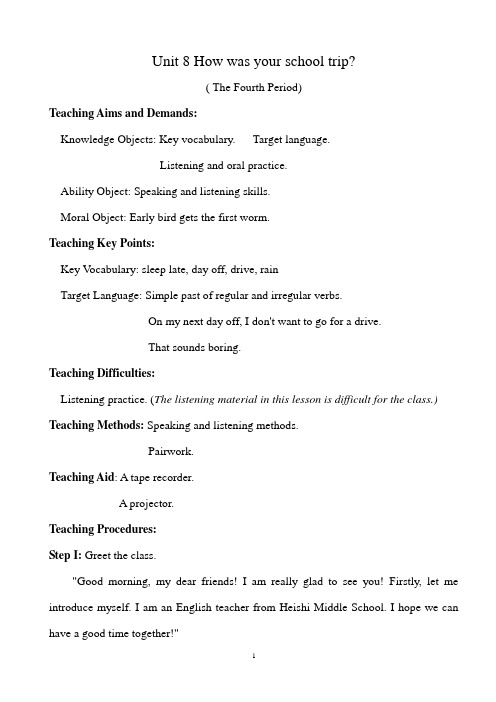
Unit 8 How was your school trip?( The Fourth Period)Teaching Aims and Demands:Knowledge Objects: Key vocabulary. Target language.Listening and oral practice.Ability Object: Speaking and listening skills.Moral Object: Early bird gets the first worm.Teaching Key Points:Key V ocabulary: sleep late, day off, drive, rainTarget Language: Simple past of regular and irregular verbs.On my next day off, I don't want to go for a drive.That sounds boring.Teaching Difficulties:Listening practice. (The listening material in this lesson is difficult for the class.) Teaching Methods: Speaking and listening methods.Pairwork.Teaching Aid: A tape recorder.A projector.Teaching Procedures:Step I: Greet the class."Good morning, my dear friends! I am really glad to see you! Firstly, let me introduce myself. I am an English teacher from Heishi Middle School. I hope we can have a good time together!"Step II: ReviewTalk about the students' last weekend."Now I want to know what you did last weekend and how your weekend was. Let's talk about it together."T: What did you do last weekend?S:…T: How was your weekend?S:…Show some pictures on the screen to help the class if it's necessary.Then show the title of this unit.Step III: Introduction and Lead-inThis class we will talk about what we don't want to do on next day off. Then Tony and Tiny will tell us what they did on their last day off. Let's play together with them. Step IV: V ocabularyShow the new words on the screen.Help the class try to read the new words.Explain the important ones to the class.1. sleep late 睡过头,起得晚sleep → slepteg: Most students sleep late on weekends. But I think we shouldn't sleep late.I slept late yesterday and I was late for school.2. drive 驾驶,驱车旅行go for a drive 开车去兜风3. day off (因病或节假日)不工作;不上学eg: We have two days off every week.I have a bad headache and I have to ask for a day off.Read and repeat.Step V: PairworkLook at the pictures and phrases in 1a.Ask several students to read the phrases to the class.Then make the class rank these activities. (Number 1 is the activity you dislike most.)Now discuss your results like this:A: On my next day off, I don't want to go for a drive. That sounds really boring.B: Oh, really? I think that sounds fun.Pay attention to the word sound.Ask pairs of students to read the dialogue above to the class.Now work with your partner. Say how you feel about the activities in 1a. Please make up some new dialogues.Let several pairs show us their conversations.Step VI: Listening practiceRead the instructions to the class.Look at the chart in 2a. And pay attention to the activities in the first column.Play the recording the first time. The students only listen.Play the tape again. And ask the students to finish the chart.Check the answers. Let the class answer this question: What did Tony/ Tiny do on his/ her last day off?Now pay attention to the statements in 2b. And ask several students to read the statements.Play the recording. And ask the class to finish 2b.Check the answers together.Step VII: PracticeComplete a letter from Tony.Translate two sentences.Step VIII:SummaryToday we have learned what Tony and Tina did on their last day off. And we also talked about our thoughts. I hope we can keep healthy and get good grades in future. So don't always sleep late on your day off.Step IX: HomeworkPractice 1b and 2c.Write a short paragraph about what you did on your last day off.Step X: Blackboard DesignUnit 8 How was your school trip?A: On my next day off, I don't want to go for a drive.That sounds really boring.B: Oh, really? I think that sounds funtook a classslept latehelped mom and dadwent camping in the rain Teaching Feeling:。
英语人教版Unit8《Howwasyourschooltrip》课件(八年级上)Period3
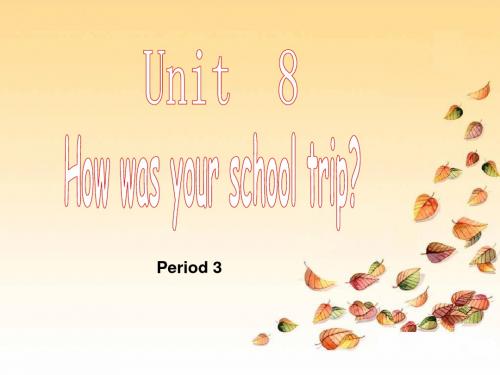
Imagine you had a school trip
How was your last school trip? Where did you go?
What was the weather like? What did you do? What else did you do? Did you…?
What do you think of it?
boring
Report :Lucy went fishing on her last day off, I think it is boring. …
Write a passage about your last day off
1.Finish English homework books. 2.Copy new words five times each.
B:Oh,really?I think that sounds fun. A:What do you want to do on your next day off? B:I want to…源自2aTony Tina
Listen.what did Tina and Tony do on their last day off? Check Tony or Tina
helped mom and dad
slept late went for went camping in the a drive rain
2b Listen again.Who said these things about their day off?Write Tony or Tina
1.It was really boring.___T_i_n_a__ 2.The weather was terrible.___T_in_a__ 3.Sounds like a busy day off?__T_i_n_a__ 4.Can you believe it?___T_o_n_y__
八年级英语上册 Unit 8 How was your school trip示范教案3 人教新目标版
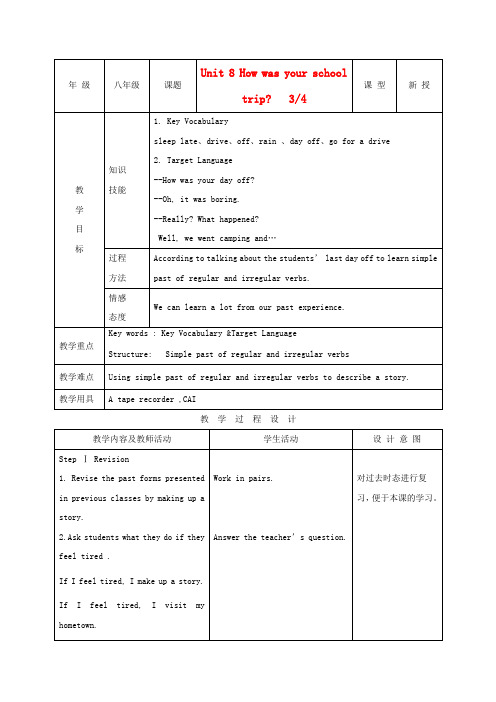
III.1b
1.Let students discuss their answers.
A: On my next day off, I don’t want to go for a drive. That sounds really boring.
B: Oh, really? I think that sounds fun.
2.Let students listen and find out what Tony and Tina did on their last day off. Put a checkmark (√) after each activity to show if Tony did it or if Tina did it.
年级
八年级
课题
Unit 8 How was your school trip? 3/4
课型
新授
教
学
目
标
知识
技能
1. Key Vocabulary
slr a drive
2. Target Language
--How was your day off?
II.1a
1.Teacher write“day off”on the blackboard and explaina“day off”means“a day when you don’t have school.”For example,“I am going to have a day off when I finish the exam.”
Unit 8 How was your school trip
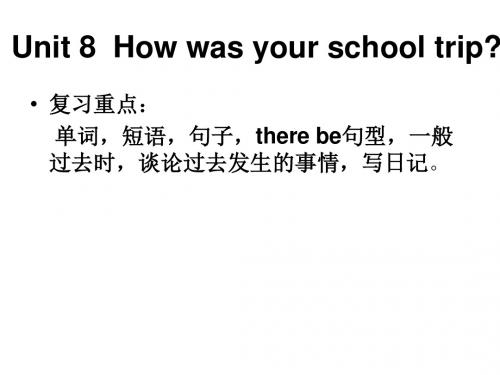
• 复习重点: 单词,短语,句子,there be句型,一般 过去时,谈论过去发生的事情,写日记。
去沙滩 go to the beach 上课 take/have a class 吃冰激凌 have ice cream 睡过头 sleep late 去水族馆 go to the aquarium 开车兜风 go for a drive 拍照 take photos 在我下一个休息日 on my next day off 去动物园 go to the zoo 和朋友闲逛 hang out with friends 一整天 all the day/the whole day 买纪念品 buy a souvenir 唱歌比赛 singing competition 获奖 win a prize 在将来 in the future 在学校郊游中 on the school trip 在午餐后 after lunch 随后 after that 野营愉快 have fun camping 累但是开心 tired but happy 摆出 put sth out 在那天结束时 at the end of the day庭院旧物出售 yard sale get wet 编故事 make up a story 淋湿
5. Class 9 had a great time on the school trip. 九班的学生在学校郊游中过得很愉快。 6. After lunch, they went to the Gift Shop and bought lots of gifts.午饭后,他们去了礼品店, 并且买了很多礼品。 7. Finally,tired but happy, they took the bus back to schoolБайду номын сангаас最后,虽然很累但很开心,他 们乘公共汽车回到学校。 8. On my next day off, I don’t want to go for a drive.在我下个休息日,我不想开车去兜风。 9. Did you have fun camping?你们野营愉快吗? 10. It rained all day.整天下雨。
八年级英语上册 Unit 8 How was your school trip(第3课时)Secti
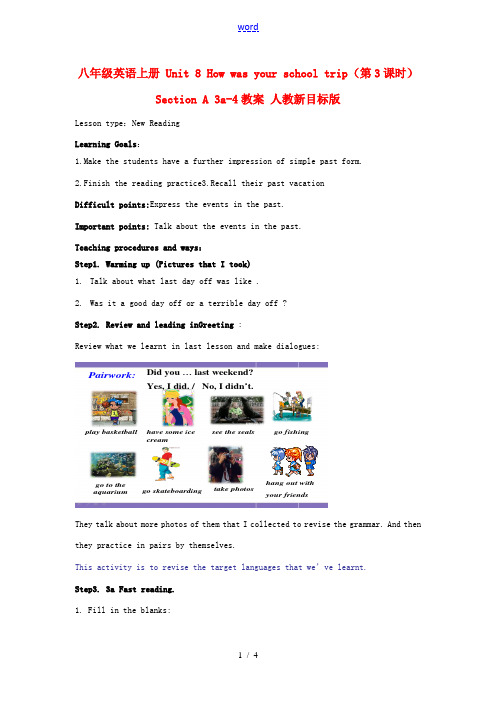
八年级英语上册 Unit 8 How was your school trip(第3课时)Section A 3a-4教案人教新目标版Lesson type:New ReadingLearning Goals:1.Make the students have a further impression of simple past form.2.Finish the reading practice3.Recall their past vacationDifficult points:Express the events in the past.Important points: Talk about the events in the past.Teaching procedures and ways:Step1. Warming up (Pictures that I took)1.Talk about what last day off was like .2.Was it a good day off or a terrible day off ?Step2. Review and leading inGreeting :Review what we learnt in last lesson and make dialogues:Did you …last weekend?Yes, I did. / No, I didn’t.Pairwork:play basketball have some icecreamgo fishinggo to theaquarium go skateboarding take photoshang out withyour friendssee the sealsThey talk about more photos of them that I collected to revise the grammar. And then they practice in pairs by themselves.This activity is to revise the target languages that we’ve learnt.Step3. 3a Fast reading.1. Fill in the blanks:First ThenAfter thatAfter lunchFinally Please fill in the chart.visited the visitors ’Center We had a great time on the school trip. We went toBlue Water Aquarium for the day.watched a movie about sharkswatched a dolphin show went to the Outdoor Pool saw a big octopus went to the Gift Shop bought lots of gifts took the bus back to schoolcleaned the bus after the trip2. Read the directions. Ask students to point to thestatements below the article. Ask different studentsto read these sentences to the class.Step4. 3a Careful reading.This activity provides reading and writingusing the target language.1. Ask students to read the article on their own. Ask the students to circle any words or phrases theydon't understand.2. Ask students to discuss with their partners about any words or phrasesthey circled. Write these items on the board and askother students to explain what they mean.3. Students canuse the word in a different sentence, point to a picture inthe book, draw a simple picture on the board, and soforth.Step 5 Go for it 1:3bThis activity provides writing and speaking practice using the target language.1.Write the following on the board: Places I visited and Things I did. Write an example of a place you visited and things you did there. Ask students for other examples and write them on the board.2. Have students write down places they visited andactivities they did in these places.Focus attention on the phrases in the speech bubbles. Ask students to make example questions.3. Ask the students to work in pairs. First one studentasks the questions and the other student answers. Thenthey change roles.4. Ask some students to say their conversations for theclass.Step 6Go for it2:4Circle Storys.This activity provides oral practice using the targetlanguage at the same it can make them take much interest in English.Have a petition. Make up a story: Each student adds a sentence.1. Read the instructions and point to the picture. Say:“Sit in a circle. One student starts the story by sayingwhere he or she went. The other students add sentences tocontinue the story.”2. Then divide the class into groups of six or eightstudents. Ask each group to sit in a different part of theroom and make their own conversation.3. Ask each group to present its conversation to theclass.Modle: A: Last week I went to ….B: The weather was ….C: I went there by ….D: I visited some interesting places and ate someseafood. They were delicious.E: … F: ….Step7 The end-of- class test当堂检测选用动词的正确形式填空be visit sound win buy see take get live1.I went to the museum and ________ some souvenirs.2.There ________ an old temple(庙)at the foot of the mountain before. 3.Last week I ________ my aunt’s house.4.We _____ some really clever kids when we were in their school.5.I think it ________ very interesting.6.He ________ in California and worked as an actor.7.After that, they ________ the bus back home.8.Who ________ the first prize? Toby did.9.Tina ________ Dean’s autograph and read it.Step8SummaryAsk the students to summarize the knowledge and then I show them on the knowledge tree .finally=at last =in the end return=come/give/go backat the end of 与inthe end /by theend of 的区别That sounds +形容词have a greattime=have fun=Enjoy oneselfStep9 Homework:1.Go over the Simple Past Tense.2.Send me an about your last school trip.My address: (我们11班)亮点1.新课的导入,选的图片都是学生特别感兴趣的话题。
Unit8Howwasyourschooltrip
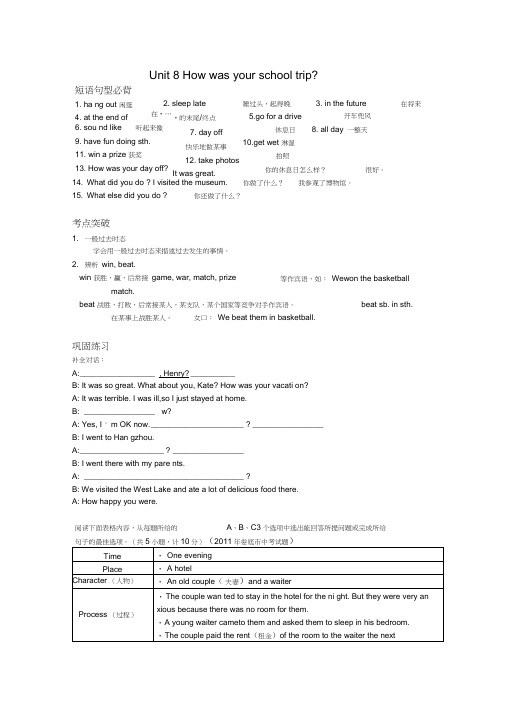
Unit 8 How was your school trip?14. What did you do ? I visited the museum.15. What else did you do ? 你还做了什么?考点突破1. 一般过去时态学会用一般过去时态来描述过去发生的事情。
2. 辨析 win, beat.win 获胜,赢,后常接 game, war, match, prizematch.beat 战胜,打败,后常接某人,某支队,某个国家等竞争对手作宾语。
beat sb. in sth.在某事上战胜某人。
女口: We beat them in basketball. 巩固练习补全对话:A: _________________ , Henry? __________B: It was so great. What about you, Kate? How was your vacati on?A: It was terrible. I was ill,so I just stayed at home.B: ________________ w?A: Yes, I ' m OK now. _____________________ ? ________________B: I went to Han gzhou.A: ___________________ ? ________________B: I went there with my pare nts.A: ____________________________________ ?B: We visited the West Lake and ate a lot of delicious food there.A: How happy you were.阅读下面表格内容,从每题所给的 A 、B 、C3个选项中选出能回答所提问题或完成所给 句子的最佳选项。
全英文说课稿 Unit 8 How was your school trip
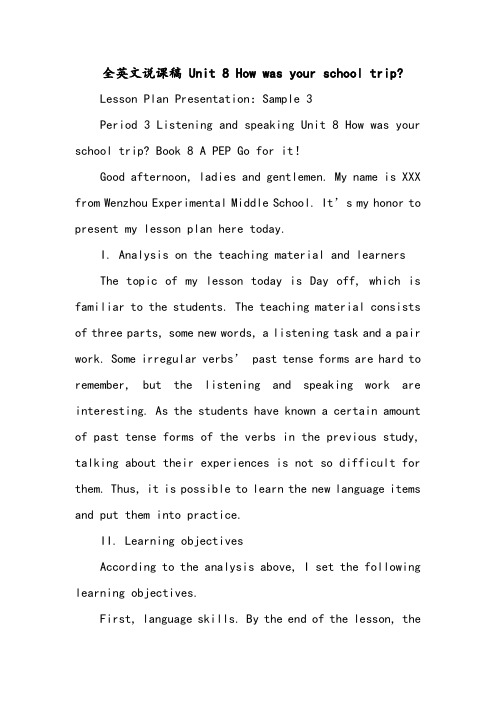
全英文说课稿 Unit 8 How was your school trip?Lesson Plan Presentation:Sample 3Period 3 Listening and speaking Unit 8 How was your school trip? Book 8 A PEP Go for it!Good afternoon, ladies and gentlemen. My name is XXX from Wenzhou Experimental Middle School. It’s my honor to present my lesson plan here today.I. Analysis on the teaching material and learnersThe topic of my lesson today is Day off, which is familiar to the students. The teaching material consists of three parts, some new words, a listening task and a pair work. Some irregular verbs’ past tense forms are hard to remember, but the listening and speaking work are interesting. As the students have known a certain amount of past tense forms of the verbs in the previous study, talking about their experiences is not so difficult for them. Thus, it is possible to learn the new language items and put them into practice.II. Learning objectivesAccording to the analysis above, I set the following learning objectives.First, language skills. By the end of the lesson, thestudents will be better able to talk about their past events using some newly learnt the past tense forms of verbs. And they will be better able to listen to catch key words about activities and key sentences of making comments. Second, language knowledge. They will know the usage of the target phrases such as, watch TV with friends, sleep late, go for a drive, take a class, help mom and dad. Then, affect. During the class, the students will know the meaning of school trip and other trips. Finally, learning strategy. They will know how to listen for the gist of conversation by catching key words and sentences.These are the language focuses (slide) and describing the past events correctly and clearly with the signal words will be the anticipated difficulty. Here are some solutions to make it easier. First, I will remind the students to pay special attention to the rules of the past forms of verbs. Second, some tasks are designed for enough oral practice by using words like first, then, after that, and finally. Third, completing the comprehensive tasks from easy to difficult, such as talking about Tina’s and Tony’s last day offs and Class 9’s last school trip, and reporting their own last day offs.To realize the above learning objectives, I mainly adopt the Communicative Approach with help of the PPT documents. My students will learn through communication and cooperation.III. Teaching procedureStep 1 is review. In this step, a story about Ann’s trip to Guangzhou will be given. The students will read the passage (slide) and fill in the blanks (the past tense forms of verbs) accordingly. In this step, they will review the words and phrases that they learned in a meaningful context. In order to review more the past tense forms of verbs I will show some pictures and ask students to tell what Class 9 did on the last school trip. Some of the words (to describe past events) and phrases are given in disorder. And then they will be adjusted by the students according to the reading passage. Next the students are asked to retell the story using first, then, after that, and finally. This is a preparation for the students to talk about their experiences clearly at sentence level. At last, students will be asked to read the passage of Section A 3a aloud and fill in the blanks, paying particular attention to the past tense forms of the verbs in the context. Thus, the wholeprocess of revision goes from words to sentences and then to discourse, making it easier for students to consolidate the target language.Step 2 is presentation and practice. In this step, I design four activities. First, I will present the new words with the help of the pictures, which can make the students understand the meaning of the verb phrases better and remember them easily. Providing more verb phrases aims to ensure the students to say more about their day off activities. Then, in order to offer the students a chance to use the new words for consolidation, I design a ranking activity, asking them to put what they like and dislike in ranks in a table. With the table, the students are asked to make conversations according to the conversation model (slide). Though the students have learnt the past tense forms of some verbs, there are more for them to learn for talking about past events. Then I firstly present the verbs and ask the students to learn the past tense forms of some verbs by heart and summarize the rules according to the given words. With all the preparations, I will ask the students to do a listening activity. They will listen to a conversation between Tina and her friend Tony about theirlast day offs. They will firstly check what Tina and Tony did and secondly mark who said those things about their day offs (slide). After listening comprehension, an imitation activity will be organized, and then I will explain how to make comments on one’s last day off.Step 3 is consolidation. In this step, a discussion as a preparation for production activities will be carries out.I will ask the students what content can be included when talking about someone’s last day off (activities, time, place, people, weather and comments…). Then I will remind them the way to describe things in time order by using first, then, after that, and finally. Next, the students will work in pairs telling Tina’s and Tony’s last day offs and Class 9’s last school trip according to the words given in the boxes (slide). In this activity, all the required words and the past tense forms of the verbs are consolidated and checked as well as the linking words (first, second, etc.) to show sequences. In this way, most students can do the job with the help of the words in the boxes. This will make a good preparation for the following production activity.During the last step, production, students will work in pairs talking about their last day offs and give a reportwith the help of the framework as followed:A: I …on my last day off. First, I ….Then, …. It was…B: That sounds…But I …. Next, I …At last,….It was…During the process of production, students will use the language items newly learnt to talk about their personal experience and then give a report in the third person. I will listen to their conversations carefully and offer help when necessary to make sure students can talk about past events well. After the pair work, the students will make a report about their partner’s last day off like this:XX went to…on his/her last day off. First, he/she…. It was…. Then, he /she…. It was…. After that, he/she…. It was…. Finally, he/she …. He/She thought ….At the end of the lesson, I will share a proverb (To travel hopefully is better than to arrive.) about traveling to tell the students the significance of travelling. For homework, I’ll ask my students to list the things they did on their last day offs using first, then, after that and finally and make a comment. I’m sure with the help of the in-class practice, students will find it easy to finish thehomework.IV. ReflectionWe know that interest is the best teacher. But interest comes from the success people achieved. I designed the whole lesson from easy to difficult, from listening to speaking. I tried my best to get each student a chance to success. All the activities contribute to the lesson as a whole and in these activities students are real communicators while I am only an organizer and a helper.Well, so much for my presentation. Thank you for your attention!。
- 1、下载文档前请自行甄别文档内容的完整性,平台不提供额外的编辑、内容补充、找答案等附加服务。
- 2、"仅部分预览"的文档,不可在线预览部分如存在完整性等问题,可反馈申请退款(可完整预览的文档不适用该条件!)。
- 3、如文档侵犯您的权益,请联系客服反馈,我们会尽快为您处理(人工客服工作时间:9:00-18:30)。
watched
(2) visit-
visited
(3)play-
played
(4) live-lived
(5) move-moved (6)decide-decided
(7) study-studied
(10)stopstopped (14)am,iswas (17)put-put
(8)copy-copied (9)cry-cried
(11)plan(12)dropdropped planned (15)go(16)dodid went (18)get(19) take took got
56
On National Day Yandan Mount
I went to Yandan.It was great.I liked it very much.
1.Where/When/Why/Who/What/How/…
2.Safety tips. Yandang 3.equipment.
Nanji Island Jiangxin Island
Nanxi Jiang
Report:We are from Group 1, we went to Yandang
Tony helped mom and dad slept late went for a drive went camping in the rain √ √ √ √
Tina
Who said these things
about their day off?
____
It was really boring.
We took part in the summer camp last summer.
drink cafe, just now, my aunt in a cafeteria
My aunt drank coffee in a cafeteria just now.
Group work
Write down the past form of these words.
I went swimming.
Make the sentences beach, I , last night, my parents I went to the beach with my parents last night. summer camp, last summer we, take part in
On that day,I didn’t want to do the cleaning.
On rainy Day
watch TV with a friend
go for a drive
sleep late
Study hard for the test
help mom
Go camping
take a class
Period Three
Make up a story. Each student adds a sentence.
Modle: Last week I visited my aunt’s house. She lives in California.
The weather was beautiful.
Talk about the trip about Yandang Mount.
What did you do on your last day off?
What did Tina do on her last day off?
What did Tina and Tony do on her last day off?
The weather was terrible.
____ห้องสมุดไป่ตู้
Sounds like a busy day off! ____ Can you believe it? ____
Talk about Tina and Tony’s last day off in pairs.
Each group chooses one of the places in China and talk about the trip,Including:
on National Day this year,…
1.Fill in the blanks with the right words given, Change the form of the word if necessary.
Then make your own sentences with the words. 2.Circle the story.
What didn’t you want to do on that day? What don’t you want to do on next National Day?
Pair work
A: On my next day off , I don’t want to go for a drive. That sounds really boring. B :Oh, really? I think that sounds fun. A:…………………… B:……………………
